The Inaugural John Perry Oration
"A life well lived"
Hellenic Australian Lawyers Association
South Australian Chapter
Adelaide
25 September 2015
 RTF version ( 14.5 mb ) |
RTF version ( 14.5 mb ) |  PDF version ( 835 kb )
PDF version ( 835 kb )
The Hon Justice Melissa Perry[1]
Justice of the Federal Court of Australia
Introduction
 I wish to say how very honoured and touched my family and I are that the South Australian Chapter of the Hellenic Australian Lawyers Association should celebrate my father's life and contribution to the law and the community by this annual oration. When responding to Harry's inquiry as to whether the family had given its blessings to this idea, I replied that I was surprised he had not heard my mother's delighted exclamations from afar! I know that if she was still with us, she most certainly would have been here, beaming with pride at every word about her beloved John.
I wish to say how very honoured and touched my family and I are that the South Australian Chapter of the Hellenic Australian Lawyers Association should celebrate my father's life and contribution to the law and the community by this annual oration. When responding to Harry's inquiry as to whether the family had given its blessings to this idea, I replied that I was surprised he had not heard my mother's delighted exclamations from afar! I know that if she was still with us, she most certainly would have been here, beaming with pride at every word about her beloved John.
It is wonderful that my father's sister, Margaret, is here with her son, Leroy, and his partner, together with so many friends and colleagues of my father and mine. My brothers also send their thanks and good wishes to those who have arranged this tribute and those attending.
My family and I hope that, through this annual oration, my father's story will continue to inspire others of Hellenic origin to achieve all that they may, with the generosity of heart and joy of life that was in my father's genes and is embedded in the Hellenic way of life. As my father modestly joked in an interview shortly before his retirement, "I've been knocking about the law for quite a while, and I'd be very disappointed if I didn't leave something behind."[2]
So where did it all begin?
Call Me Emilios
In his autobiography Call Me Emilios,[3] Emilios Kyrou describes his parents' courageous decision to move to a foreign land. That land was almost as far away as it was possible to be from their family and crop fields on the tiny village, Sfikia, in northern Greece. They sought to escape poverty and to provide a better future for their young family, including Emilios then aged 6. As a young migrant growing up in Victoria, Emilios was all too often told to "go back to your own country" when passing strangers in shopping centres, on trains and buses, or in the park. He wished he was invisible. When children at his primary school pitched racist taunts because of his name, his hair cut, his homemade clothes and the food in his lunchbag, he decided to adopt the "protection" of the Anglo-sounding name of John.
However, as he grew older and more confident in himself, he came to appreciate how brave his parents had been when they decided to take the long voyage to Australia, and that any hardship he was enduring paled into insignificance beside his parents' daily struggles. He also came to recognise that aspects of Greek culture, such as the strong focus on family and community, had much to commend them; and that there were advantages in speaking two languages and being able to draw upon the best of Greek and Australian culture. In time, he came to reclaim with pride his identify in asking people again to call him Emilios.
I am fortunate now to work with his Honour, Justice Emilios Kyrou of the Supreme Court of Victoria, on the Judicial Council on Cultural Diversity.[4] The Council is an advisory body formed to assist Australian courts and tribunals to respond positively to the needs of our culturally and linguistically diverse population in accessing justice, including our indigenous peoples.
My Father's Story
 Justice Kyrou's story resonates strongly with me. My father was the son of migrants. His father migrated to Australia in the depression in the 1920s as a young man from Farmagusta in Cyprus and my grandmother, from Liverpool in England. Both came from seafaring families. My grandfather worked as a waterside worker at Port Adelaide. Like many migrant families at that time, he decided to anglicise his name from "Pieris" to "Perry" – a decision which my father later regretted – and did not speak Greek at home. [5]
Justice Kyrou's story resonates strongly with me. My father was the son of migrants. His father migrated to Australia in the depression in the 1920s as a young man from Farmagusta in Cyprus and my grandmother, from Liverpool in England. Both came from seafaring families. My grandfather worked as a waterside worker at Port Adelaide. Like many migrant families at that time, he decided to anglicise his name from "Pieris" to "Perry" – a decision which my father later regretted – and did not speak Greek at home. [5]
In explaining in an address to the Greek Orthodox Community Youth Forum in 2004 why such pressures existed, my father spoke of how migration policy in the first half of the last century was overshadowed by the White Australia Policy and characterised by assimilation. He observed that "[i]t is a sad reflection upon humanity that it took the evil and the horrors of… the Second World War, to change all that."[6] It was only in that post second world war period that we saw the rapid development of human rights in international law which in turn came to be embraced in our domestic laws and societal values – the first domestic anti-discrimination law being enacted in South Australia in 1966.[7]
 My father rarely spoke of his childhood. A photograph of him taken then depicts a serious young boy with large, soulful eyes clutching his violin. As a child, like Justice Kyrou and many other migrant children, my father was keen to blend in and never invited his classmates over to his modest family home. He was, however, quite imaginative about raising his own pocket money. Enterprises on which he embarked included delivering newspapers and leading cattle around the ring at the Adelaide Show, bringing home a bucket of milk from the prize cows for his mother at the end of the day. He even busked on one occasion on his violin with another little boy playing the trumpet outside the Goodwood Park Hotel until his father who was imbibing of a drink at the bar marched him home!
My father rarely spoke of his childhood. A photograph of him taken then depicts a serious young boy with large, soulful eyes clutching his violin. As a child, like Justice Kyrou and many other migrant children, my father was keen to blend in and never invited his classmates over to his modest family home. He was, however, quite imaginative about raising his own pocket money. Enterprises on which he embarked included delivering newspapers and leading cattle around the ring at the Adelaide Show, bringing home a bucket of milk from the prize cows for his mother at the end of the day. He even busked on one occasion on his violin with another little boy playing the trumpet outside the Goodwood Park Hotel until his father who was imbibing of a drink at the bar marched him home!
 It was not until my father met my mother that he grew to appreciate his Greek heritage. They were both students at the Elder Conservatorium of Music at the University of Adelaide, with my father continuing his love of the violin, and my mother, her love of the piano. With her love of literature and classical Greece, this shy, romantic young girl was won over by his handsome dark looks and defied certain of the more staid members of her family to marry. In time they had three children, Michael, Julian and me, of whom they were enormously proud and supportive.
It was not until my father met my mother that he grew to appreciate his Greek heritage. They were both students at the Elder Conservatorium of Music at the University of Adelaide, with my father continuing his love of the violin, and my mother, her love of the piano. With her love of literature and classical Greece, this shy, romantic young girl was won over by his handsome dark looks and defied certain of the more staid members of her family to marry. In time they had three children, Michael, Julian and me, of whom they were enormously proud and supportive.
My father also studied law. He once candidly explained that his mother said he should be a lawyer, "so I went off and did a law degree".[8]
Greek hospitality was in my father's genes and, with my mother's passion for Mediterranean cooking, there were many long lunches and dinners with fellow members of the profession and their wonderfully diverse group of friends – occasions of which many of you here, I am sure, have happy memories. As Ms Margaret Kelly, then President of the Law Society, said at my father's retirement in comparing his Honour to a bottle of vintage wine (and I should say, a full bodied cabernet shiraz) - he "is a wine best enjoyed over lunch and dinner, accompanied by an elegant sparkling wine known as Jennifer."[9]
And of course, mention could not be made of their hospitality without referring to their famous Christmas drinks on the lawn at Avenue Street, the fare for which inevitably had a Greek slant. I remember patiently making dolmades and taramaslata under my mother's tuition in her bright yellow and orange kitchen with the sunshine streaming in through the window and a golden retriever waiting patiently (or sometimes not so patiently) for any accidental offerings.
 Together with University friends from Czechoslovakia, my parents started making wine well before I was born from the grapes that hung from my grandmother's pergola, pressing the grapes through an old clothes wringer much, no doubt, to my grandmother's chagrin! The production of Chateau Michael (named after my older brother) was a Perry family tradition that continued in an increasingly more sophisticated form throughout my father's lifetime. Significant events in the close-knit winemaking syndicate, such as the birth of a child or adoption of a furry, four-legged member of the family, were recognised with appropriate vintages.
Together with University friends from Czechoslovakia, my parents started making wine well before I was born from the grapes that hung from my grandmother's pergola, pressing the grapes through an old clothes wringer much, no doubt, to my grandmother's chagrin! The production of Chateau Michael (named after my older brother) was a Perry family tradition that continued in an increasingly more sophisticated form throughout my father's lifetime. Significant events in the close-knit winemaking syndicate, such as the birth of a child or adoption of a furry, four-legged member of the family, were recognised with appropriate vintages.
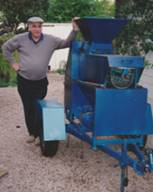 My father also played quartets throughout his adult life with university friends. These included Ernest Hirsch, a Jewish physicist who escaped Nazi Germany and was still conducting his research at the University of Adelaide into his 90s, and Anders Wangel who met his wife, Denise, at the Helsinki Olympics in 1952. Anders sailed for Finland, while Denise swam for Australia and indeed was the first South Australian to represent Australia at an Olympic games.[10] Anders' achievements include three medical doctorates by thesis, fluency in four languages and a passion for teaching.[11]
My father also played quartets throughout his adult life with university friends. These included Ernest Hirsch, a Jewish physicist who escaped Nazi Germany and was still conducting his research at the University of Adelaide into his 90s, and Anders Wangel who met his wife, Denise, at the Helsinki Olympics in 1952. Anders sailed for Finland, while Denise swam for Australia and indeed was the first South Australian to represent Australia at an Olympic games.[10] Anders' achievements include three medical doctorates by thesis, fluency in four languages and a passion for teaching.[11]
It is no surprise when I reflect on such things, that my father should have been a passionate advocate for multiculturalism which he pursued in many ways, including through his membership of the Multicultural Forum. My parents lived multiculturalism and their lives were lives well lived as a result.
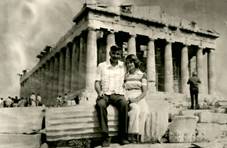 But I must acknowledge that one of the many gifts that my mother gave my father was that, through her love of history and travel, and her passion for embracing other cultures, my father came to embrace and be proud of his Greek heritage. And as my father embraced his heritage, so he began to give back to the Greek community.
But I must acknowledge that one of the many gifts that my mother gave my father was that, through her love of history and travel, and her passion for embracing other cultures, my father came to embrace and be proud of his Greek heritage. And as my father embraced his heritage, so he began to give back to the Greek community.
My mother also instilled in me great pride in my Greek heritage. Indeed, as a little girl so proud was I of the achievements of the birthplace of democracy that I can see myself reflected in the character Gus Portokalos in My Big Fat Greek Wedding, who found a Greek derivation to every word – "Give me a word", he said, "any word, and I show you that the root of that word is Greek". Even the word "kimono" did not stump him for long!
Importantly, though, what I take from the stories of Emilios and my father is that it is only when we can take pride in who we are, and do not feel that we must be invisible, that we can achieve our true potential to the betterment of society and in pursuit of our own happiness.
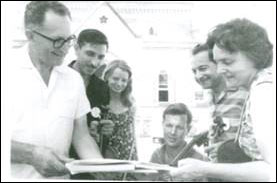
My father's contribution to law
My father had no contacts in the law when he began, save for my mother's Auntie Murial who worked as a book-keeper with Travers, Melville, Kelly and Hague (later Kelly & Co and now HWL Ebsworth). She arranged an interview with one of the partners, Michael White, who offered my father a position as an articled clerk. My father said that he could not recall a harsh word having been spoken in all of his 20 years with the firm,[12] although his request as an articled clerk for time off to rehearse with the Adelaide Symphony Orchestra for the Queen Mother's visit was apparently met with some bemusement.[13] During his time at Kelly's, my father in turn mentored many articled clerks, including Lindy Powell QC and former Chief Justice John Doyle AC who described him as "the progressive young partner. He was the one who promoted change and reform."[14] Some of my earliest memories are keeping my father company as he worked at Kelly's on the weekend, dictating into a huge machine with spinning reels as I made pictures with the not-negotiable stamps.
My father said of his early court appearances as a young solicitor, that they:
…were highlighted by the sense of remoteness which surrounded the judges of the Supreme Court in the eyes of the new practitioner, and the feelings of inadequacy which overwhelmed me when I first started to argue cases before them.
All of this made me feel that ultimate elevation to the bench was little more than a mirage…[15]
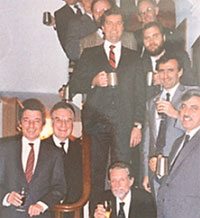 When my father took silk in 1979, he left his home for so long in the law at Kelly's to join Bar Chambers. This classic bluestone residence built in 1866 had been established as a set of barrister's chambers by the founder of the South Australian Bar, the Hon. Chris Legoe AO, together with Howard Zelling, in 1965.[16] Early members included Robin Millhouse and Michael Birchall who were still members of chambers when my father joined.[17]
When my father took silk in 1979, he left his home for so long in the law at Kelly's to join Bar Chambers. This classic bluestone residence built in 1866 had been established as a set of barrister's chambers by the founder of the South Australian Bar, the Hon. Chris Legoe AO, together with Howard Zelling, in 1965.[16] Early members included Robin Millhouse and Michael Birchall who were still members of chambers when my father joined.[17]
While my father said that he had left his firm with some reluctance, he said of this time that "[t]he friendships at Bar Chambers and the camaraderie of the bar will always live in my memory as one of the most enjoyable phases of my professional career."[18]
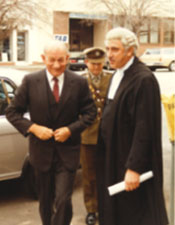 In the course of his practice, my father appeared in many jurisdictions, including the High Court, across a broad diversity of civil cases in the nature of a true generalist. He was also an advocate for the independence of the Bar, recognising the importance of the cab rank rule obliging barristers to take on briefs when available in their sphere of work without fear or favour irrespective of the client's identity.[19]
In the course of his practice, my father appeared in many jurisdictions, including the High Court, across a broad diversity of civil cases in the nature of a true generalist. He was also an advocate for the independence of the Bar, recognising the importance of the cab rank rule obliging barristers to take on briefs when available in their sphere of work without fear or favour irrespective of the client's identity.[19]
My father's sense of social justice and equality was reflected in his passion for representing migrants who had suffered injury at work,[20] as had his father who had been unable to work after his hands were badly injured in a work accident in which he lost several fingers. In speaking of this at the Greek Orthodox Community Youth Forum,[21] he explained that when he started legal practice:
It was the migrant population which largely provided the work force for our factories, our foundries, our railways.
[Yet] Work place safety was a very undeveloped concept. There was a high incidence of injuries. I acted for many migrants who were casualties of that circumstance.
In turn, he gained much personally from this work, explaining that:
Largely Italian and Greek migrants, they were wonderful people. I could see how much they valued family life and how earnestly they strove to do for their children what my parents had done for me.
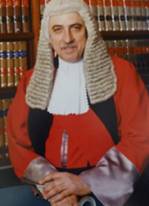 In March 1988 he was appointed to the Supreme Court of South Australia joining among others his former principal, partner and mentor, the late Hon. Justice Michael White AO. He served on the Court for 19 years, presiding over many substantial trials and appeals, and, somewhat dauntingly for me, produced over 2000 judgments! In addition, he found time to deliver some 60 papers and speeches to diverse audiences here and abroad.
In March 1988 he was appointed to the Supreme Court of South Australia joining among others his former principal, partner and mentor, the late Hon. Justice Michael White AO. He served on the Court for 19 years, presiding over many substantial trials and appeals, and, somewhat dauntingly for me, produced over 2000 judgments! In addition, he found time to deliver some 60 papers and speeches to diverse audiences here and abroad.
Yet, his diligence and productivity did not lead to the development of a dour and isolated man. He quickly assumed the role of social organiser and, with his judicial colleague the Hon. Margaret Nyland AM, the floor became the party floor with events including the Magic Cave at Christmas and Easter Bonnett parties. In these events his associates were keen participants.
I flew back from Cambridge to be present at his swearing in and recall being overwhelmed by the depth of his service to the profession and to the community described by those who spoke at that occasion with such respect and warmth. I hope you will forgive me if I give you something of the flavour of that service.
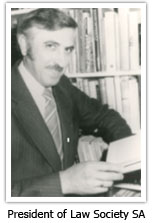 He served the Law Society in many capacities, including as Chair of the Common Law and Continuing Legal Education Committees, a member of its Statutory Committee and later, the Disciplinary Tribunal, and was Law Society President in 1984-1985 during which his calendar was so full that even my mother had to book appointments to see him! While President, he was instrumental in developing the professional conduct rules which encouraged standards of excellence for the private profession and harmonisation of the relationship between the emerging Bar and the amalgam profession. [22]
He served the Law Society in many capacities, including as Chair of the Common Law and Continuing Legal Education Committees, a member of its Statutory Committee and later, the Disciplinary Tribunal, and was Law Society President in 1984-1985 during which his calendar was so full that even my mother had to book appointments to see him! While President, he was instrumental in developing the professional conduct rules which encouraged standards of excellence for the private profession and harmonisation of the relationship between the emerging Bar and the amalgam profession. [22]
Outside of the Law Society, he was the South Australian Chair of the Commonwealth Committee on Discrimination in Employment and Occupation, and a member of the Legal Services Commission from its inception in 1979 to 1986, the Law Reform Committee of South Australia and the Legal Practitioners Education and Admissions Council.
He was also passionate about the value of education recognising no doubt how significant it had been in his life.
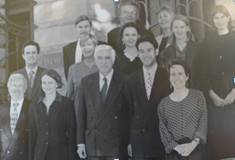 This passion was reflected in his membership of the Council of Hartley College of Advanced Education, the Council of my old school, Walford,[23] the Faculty of Law at the University of Adelaide, the Elder Conservatorium External Advisory Board, and in other small but significant ways such as his continued mentoring and encouragement of his associates of whom he was so proud.
This passion was reflected in his membership of the Council of Hartley College of Advanced Education, the Council of my old school, Walford,[23] the Faculty of Law at the University of Adelaide, the Elder Conservatorium External Advisory Board, and in other small but significant ways such as his continued mentoring and encouragement of his associates of whom he was so proud.
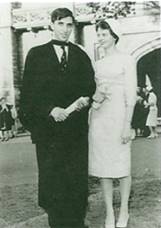 During his time as a judge, he was instrumental in establishing the John Bray Law Chapter of the Alumni Association of the University of Adelaide, serving as its Chair. He also served on the Council of the University of Adelaide where he took particular pride in actively contributing to the revitalisation of the Adelaide Law School and in saving his beloved Elder Conservatorium from being moved offsite to an institute of technology and rebadged.[24] The sounds of his violin, donated by my mother to the Conservatorium, continue to resonate beneath the fluted wooden arches of the Elder Hall where my parents once played together, and students at the University continue to benefit from the prizes and memorial fund established in his name.[25]
During his time as a judge, he was instrumental in establishing the John Bray Law Chapter of the Alumni Association of the University of Adelaide, serving as its Chair. He also served on the Council of the University of Adelaide where he took particular pride in actively contributing to the revitalisation of the Adelaide Law School and in saving his beloved Elder Conservatorium from being moved offsite to an institute of technology and rebadged.[24] The sounds of his violin, donated by my mother to the Conservatorium, continue to resonate beneath the fluted wooden arches of the Elder Hall where my parents once played together, and students at the University continue to benefit from the prizes and memorial fund established in his name.[25]
My father was, in short, if I may mix my metaphors, a Renaissance man and a powerhouse. Yet, in his typically modest manner, at his swearing in he invited counsel to remind him if he should "ever show any sign of becoming remote from or unresponsive to the ordinary problems of everyday life."[26]
My father's citation of international law
Finally, while my father taught me much, it is less known that there was at least one thing for which I feel I can take some credit in teaching him.
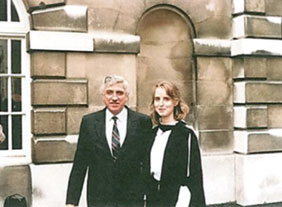 My parents were very supportive of my postgraduate studies abroad. But I do recall that when I was extolling the virtues of remaining at Cambridge to write a PhD in international law, my father was concerned to give me a little gentle advice in an effort to keep me on the "straight and narrow". As you want to practice, he said, why not write a PhD on something useful - like a topic in commercial law.
My parents were very supportive of my postgraduate studies abroad. But I do recall that when I was extolling the virtues of remaining at Cambridge to write a PhD in international law, my father was concerned to give me a little gentle advice in an effort to keep me on the "straight and narrow". As you want to practice, he said, why not write a PhD on something useful - like a topic in commercial law.
But in my usual headstrong, stubborn way, I determined to pursue my chosen topic. Yes – it might be said that the more esoteric aspects of my topic were to be found in the writings of Grotius and Pufendorf, European jurists in the 16th to 17th Centuries. Indeed, if I may return to a Gus Portokalos moment, the earliest jurisprudence on the subject of my PhD was Aristotle.[27] But any notion that my topic was not practical was refuted by the extraordinary events taking place in Europe as I wrote and about which I wrote – including the breakup of the former USSR and Yugoslavia, and the bringing down of the Berlin Wall. [28]
My father was a reflective man and so in his later years on the Bench, he came to be one of the first Australian judges to turn to international human rights law in the exercise of discretions.[29] This, among other things, he shared with the Hon. Michael Kirby AC CMG who was a great friend of both of my parents. Perhaps my father's appearance before the International Court of Justice in a moot at a conference in Cairo had also made an impression.[30] In particular, in sentencing decisions, my father was known to refer to Australia's international obligations and construe the law in light of those obligations.
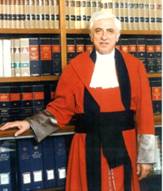 In Abdulla[31] and Ingomar,[32] for example, Perry J (snr) held that, when sentencing young Aboriginal adults convicted of offences committed under the influence of alcohol, the Court must be cognisant of the existing disadvantage faced by them (including that alcohol abuse is an expression of that situation of economic and cultural disadvantage), and must be mindful that a prison sentence is more likely to impact more heavily on them, than on defendants who do not suffer under such disadvantage.[33]
In Abdulla[31] and Ingomar,[32] for example, Perry J (snr) held that, when sentencing young Aboriginal adults convicted of offences committed under the influence of alcohol, the Court must be cognisant of the existing disadvantage faced by them (including that alcohol abuse is an expression of that situation of economic and cultural disadvantage), and must be mindful that a prison sentence is more likely to impact more heavily on them, than on defendants who do not suffer under such disadvantage.[33]
His Honour drew support for this approach from the United Nations International Labour Organisation Convention No 169 concerning Indigenous and Tribal Peoples in Independent Countries 1989.[34] Whilst Australia was not a party to the Convention, his Honour observed that:
…it is an indication of the direction in which international law is proceeding. In the area of human rights particularly, Australian Courts should always be prepared to take into account international instruments where they identify precepts of universal application, at least where they are not in conflict with the domestic laws of this country.[35]
Speaking at my father's retirement ceremony on 2 April 2007, then Chief Justice Doyle said of my father's contribution in this field:
In more recent years your Honour has developed a strong interest… in the potential for international law to influence our domestic law, particularly on issues raising human rights. That interest is reflected by the citations that can be found in your Honour's judgments. Your Honour might well think in this respect you have been casting your seed on stony soil. Australian lawyers are undoubtedly insular in their approach to the law. Developments in international law have had little influence on our domestic law. However it is appropriate for all of us to be reminded of the perspectives that international law brings and I suspect that, in time, the approach which your Honour has been taking will become more influential.[36]
Recognition for public service
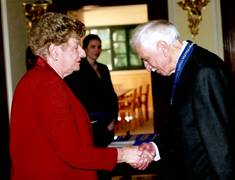 My father's energy and commitment to public service was recognised shortly before his untimely death with his appointment as an Officer of the Order of Australia for his service to the judiciary and to the law, particularly as a contributor to the activities of professional regulatory committees, to legal education and for service to the public. It was, as the Attorney General said at his retirement ceremony, "[a] perfect and most well deserved coda in [his] final year on the bench." [37]
My father's energy and commitment to public service was recognised shortly before his untimely death with his appointment as an Officer of the Order of Australia for his service to the judiciary and to the law, particularly as a contributor to the activities of professional regulatory committees, to legal education and for service to the public. It was, as the Attorney General said at his retirement ceremony, "[a] perfect and most well deserved coda in [his] final year on the bench." [37]
Concluding Thoughts
From his early days in the law where my father described the prospects of attaining judicial office as a "mirage", to the reality of many years of service on the bench...
What my father's story shows to my mind is that no matter how modest our beginnings, there is truly nothing that we cannot aspire to achieve, and that we are all the more likely to achieve our dreams if we embrace who we are - sentiments embodied in HAL's objects. These achievements, in turn, are so much more rewarding when life is approached with the kind of generosity of spirit that my father exemplified and which exemplifies Greek culture and tradition. My father's life was rich and complete because he sought to share all that he could with others, and particularly young people. Whether it was hospitality, friendship, encouragement, experience, knowledge, compassion or time, he gave without ever counting the cost. I think it is true to say that my father has left much behind.
I wish again to thank HAL for the opportunity to celebrate and share with you, the story of a life well lived.
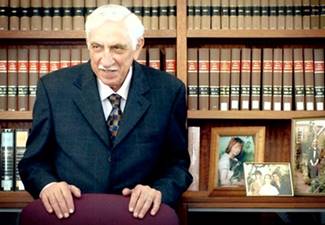
[1] LL.B (Hons)(Adel), LL.M, PhD (Cantab), FAAL. The author gratefully acknowledges the valuable assistance of her associate, Ms Sibella Matthews.
[2] Sean Fewster, 'Giving kids a fair go motivates judge', The Advertiser (Adelaide), 26 January 2007.
[3] Emilios Kyrou, Call me Emilios (Emilios Kyrou, 2012).
[4] The JCCD is endorsed by the Council of Chief Justices of Australia and its purpose is "to develop a framework to support procedural fairness and equality of treatment for all court users – regardless of their race, colour, religion, or national or ethnic origin – and to promote public trust and confidence in Australian courts and the judiciary": JCCD, Judicial Council on Cultural Diversity (2015) <http://www.jccd.org.au/> (viewed 25 September 2015).
[5] John Perry, 'Young Greek Australians in the 21st Century' (Speech delivered at the Greek Orthodox Community Youth Forum, Adelaide, 6 June 20014), 2.
[6] Ibid.
[7] The first anti-discrimination legislation in Australia was the Prohibition of Discrimination Act 1966 (SA). The South Australian Parliament was quick to act as the International Convention on the Elimination of All Forms of Racial Discrimination had been unanimously adopted by the UN General Assembly less than a year earlier in December 1965 (106 votes to none). The first Commonwealth anti-discrimination legislation was the Racial Discrimination Act 1975 (Cth), followed by the Sex Discrimination Act 1984 (Cth), Human Rights and Equal Opportunity Commission Act 1986 (Cth), Disability Discrimination Act 1992 (Cth) and Age Discrimination Act 2004 (Cth).
[8] Transcript of Proceedings, Special Sitting on the Retirement of the Hon. Justice Perry (Supreme Court of South Australia, Doyle CJ, Perry, Debelle, Nyland, Bleby, Gray, Anderson, White, Layton, David And Kelly JJ, 2 April 2007) 7.
[9] Ibid 13.
[10] Swimming SA, 2013-2014 Annual Report (2013), 23.
[11] John Beltrame, Emeritus Professor Anders Gustaf Wangel (11 June 2013) University of Adelaide Faculty of Health Sciences <http://blogs.adelaide.edu.au/health/2013/06/11/emeritus-professor-anders-gustaf-wangel/>.
[12] Transcript of Proceedings, Special Sitting on the Retirement of the Hon. Justice Perry (Supreme Court of South Australia, Doyle CJ, Perry, Debelle, Nyland, Bleby, Gray, Anderson, White, Layton, David And Kelly JJ, 2 April 2007) 16.
[13] Ibid 15.
[14] John Doyle, 'Obituary: A Dedicated Man – The Hon. John William Perry AO QC: 1937-2007', (2007) Law Society Bulletin (June), 20.
[15] Perry, above n 5, 5-6.
[16] John Emerson, History of the Independent Bar of South Australia (Barr Smith Press, Adelaide, 2006), 17 and 21.
[17] Ibid 53.
[18] Transcript of Proceedings, Special Sitting on the Retirement of the Hon. Justice Perry (Supreme Court of South Australia, Doyle CJ, Perry, Debelle, Nyland, Bleby, Gray, Anderson, White, Layton, David And Kelly JJ, 2 April 2007) 16.
[19] Ibid.
[20] Ibid 7.
[21] Perry, above n 5, 5.
[22] Transcript of Proceedings, Special Sitting of the Full Court for the Presentation of Commission by Justice Perry (Supreme Court of South Australia, 7 March 1988) 8.
[23] Walford Church of England Girls Grammar School.
[24] The Elder Conservatorium honoured that contribution when they provided for his memorial service to be held in Elder Hall.
[25] My father established the John Perry Prize for Public International Law while at the same time I established the Perry Prize for the Master of Comparative Law. Further, following my father's death in 2007, gifts were made to the University of Adelaide to establish the John Perry Memorial Perpetual Fund in 2008. The fund provides for annual an award to be made to an Elder Conservatorium student studying at the University of Adelaide to travel to and from competitions, performances and workshops to enhance the student's experience: see further https://www.adelaide.edu.au/legalandrisk/trusts-bequests/scholarships/UTR2.228.pdf .
[26] Transcript of Proceedings, Special Sitting of the Full Court for the Presentation of Commission by Justice Perry (Supreme Court of South Australia, 7 March 1988) 11.
[27] Aristotle, The Politics (translated by T A Sinclair, Penguin Books, 1962), 105-106.
[28] My doctoral thesis at Cambridge University considered a range of issues associated with boundaries in the event of a succession of States, such as the decolonisation of Africa, the breakup of the former USSR and the reunification of Germany, in order to identify the mechanisms and principles by which international boundaries might continue, and new boundaries be created, following such events.
[29] See also John Perry, 'At the intersection: Australian and International Law' (1997) 71 Australian Law Journal 841.
[30] Transcript of Proceedings, Special Sitting of the Full Court for the Presentation of Commission by Justice Perry (Supreme Court of South Australia, 7 March 1988) 7.
[31] Police v Abdulla (1999) 74 SASR 337; Abdulla involved a young women charged with breaking and entering a child care centre and stealing face paint, a book on face-painting and a frozen pizza. The police appealed the sentence of 5 days imprisonment imposed by the Magistrate on the break and enter charge. While previous authorities had held that "only an unusual case of break and entering should attract a sentence of less than nine to twelve months, even for a first offence" (R v Halse (1985) 38 SASR 592 at 595 (King CJ)), Perry J upheld the Magistrate's sentence. In so doing, his Honour recognised that s 11 of the Criminal Law (Sentencing) Act 1988 (SA) made it plain that a sentence of imprisonment must be regarded as a sentence of last resort.
[32] Ingomar v Police (1998) 72 SASR 232.
[33] Ibid 235.
[34] United Nations International Labour Organisation Convention No 169 concerning Indigenous and Tribal Peoples in Independent Countries 1989 done at Geneva on 27 June 1989 (UNTS 1650).
[35] Police v Abdulla (1999) 74 SASR 337 at 344.
[36] Transcript of Proceedings, Special Sitting on the Retirement of the Hon. Justice Perry (Supreme Court of South Australia, Doyle CJ, Perry, Debelle, Nyland, Bleby, Gray, Anderson, White, Layton, David And Kelly JJ, 2 April 2007) 4. See further the discussion in Wendy Lacey, 'Judicial discretion and human rights: expanding the role of international law in the domestic sphere', (2004) 5 Melbourne Journal of International Law 108 at 121-123, and Chris Charles, 'The law of sentencing applied to Aboriginal People in South Australia' (Paper presented at the Indigenous Justice Conference, Australian Institute of Judicial Administration, South Australia, 18-19 July 2013). See also papers by the Hon. Michael Kirby AC CMG mentioning my father in this regard, including Kirby, M, 'Domestic Implementation of International Human Rights Norms' (1999) 5(2) Australian Journal of Human Rights 109 and Kirby, M, 'International Law and the Common Law: Conceptualising the New Relationship' (Speech delivered at the 2009 James Crawford Biennial Lecture on International Law, Adelaide, 14 October 2009).
[37] Ibid 9.








